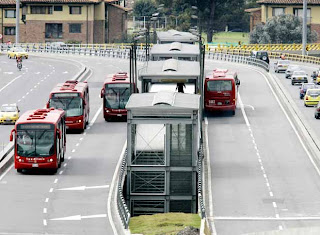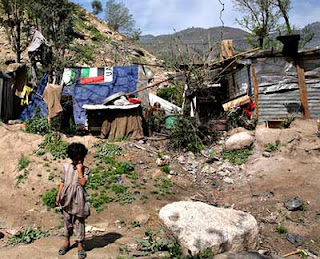Piling on
May 28th 2009
From The Economist print edition
In his zeal to fix capitalism, Barack Obama must not stifle America’s dynamism
DEFENDING American capitalism these days is a thankless job. Reckless lending by American financiers produced a crisis that has pushed the world into its worst recession since the 1930s. Tales of greed and fraud during the boom years abound.
Small wonder that although Americans still prefer their government neat and local, they are a little less hostile to federal activism these days. Such sentiments, last November, helped propel Barack Obama into the White House and his Democratic Party to bigger majorities in both houses of Congress. As Rahm Emanuel, the president’s chief of staff, says, Mr Obama does not want to waste this crisis. He is using it to create a bigger role for government throughout the economy, from education and health care to banking and energy.
Small wonder that although Americans still prefer their government neat and local, they are a little less hostile to federal activism these days. Such sentiments, last November, helped propel Barack Obama into the White House and his Democratic Party to bigger majorities in both houses of Congress. As Rahm Emanuel, the president’s chief of staff, says, Mr Obama does not want to waste this crisis. He is using it to create a bigger role for government throughout the economy, from education and health care to banking and energy.
He, and Congress, risk overreaching. America has experienced a failure of finance, not of capitalism. Its broader economy remains an astonishing Petri dish of creative destruction. Even in boom times, 15% of American jobs disappear each year. Their places are taken by new ones created by start-ups and expansions. This dynamism remains evident today, amid the most crushing economic conditions most businesses have encountered. As icons of consumer excess like Starbucks and Neiman Marcus stumble, purveyors of frugality like Burger King and Wal-Mart prosper. Americans are adept at finding opportunity in adversity.
Where government helps
The American economy is dynamic because Americans like it that way, even now. A Pew poll released on May 21st found that 76% of Americans agree that the country’s strength is “mostly based on the success of American business” and 90% admire people who “get rich by working hard”. These proportions have changed little in two decades, and they tend to produce government policies that make America, according to the World Bank, consistently one of the best places to do business.
Yet Mr Obama—and, even more, his Democratic allies in Congress—could do lasting damage to this marvellous machine. That is not because the president is a socialist, as his detractors on talk radio claim. No true leftist would be as allergic as he has been to nationalising tottering banks, nor as coldly calculating in letting Chrysler, and probably General Motors, end up in bankruptcy court.
Moreover, even the most stalwart defenders of the free market, including this newspaper, admit it has shortcomings that only the government can address. The financial system requires close oversight, or crises will destabilise it. In recent years, such oversight has often been absent or fragmented. Only government can enforce competition rules, insist that business and consumers limit carbon-dioxide emissions, or intervene to make health care available to those too sick or poor to afford it. And the current crisis calls for aggressive and temporary fiscal and monetary intervention that is not justified in ordinary times.
But the Democrats’ present zeal for government activism often goes well beyond addressing market failures. The president and Congress seem to believe that they can surgically intervene in the economy but overlook the unintended consequences. They are willing to demonise business when doing so furthers their aims. In one breath Mr Obama praises a bank that wrote down its claims on Chrysler and in the next lashes out at investors who, as was their right, did not.
Members of his team believe that tougher rules for business are necessary to cool voter anger that would otherwise result in even more vindictive measures. But rather than tamping down the backlash, they may only feed it. They aggravate that risk by outsourcing rule-writing to Congress, as with the fiscal stimulus and carbon emissions and, soon, health care. Congress is much more likely than the executive branch to let special interests or demagoguery shape the outcome.
Creating new monsters
Too often, the result is overkill. Last December the Federal Reserve approved sweeping new rules on credit cards. Congress said it was not enough, and passed its own law which takes effect sooner and is even more restrictive. Some provisions restrain genuinely odious practices, such as charging interest on already-paid balances, but others prevent banks from tailoring interest rates to customers’ changing risks.
The approach to energy is worse. Under a mammoth carbon-emissions bill now working its way through Congress, 85% of valuable permits to emit carbon dioxide (which might all have been auctioned) will be given away free. This creates a huge new pot of favours for government to hand out, and new incentives for businesses to lobby. It will be costlier to fight climate change, while harder to avoid political favour-trading.
Mr Obama’s people seem sincere when they say they want to rid the government of its stakes in banks and carmakers as soon as possible. But in the meantime they are introducing new rules, such as limits on performance-related pay at banks, that could do more harm than good (see article). Nor can they resist using that ownership to push goals unrelated to the firms’ welfare, such as pressing banks to relent on foreclosures or carmakers to make alternative-fuel cars for which there is no obvious demand. On top of that, they are passing more stringent fuel-economy standards that favour light trucks over cars. A far less distorting (and transparent) way to cut carbon emissions and raise fuel economy would be a carbon tax—but almost no one in Washington has the courage to propose one.
These mistakes matter because, for all Mr Obama’s oratory, it will be very hard to reverse course in future. Regulations and interventions spawn constituencies that will fight any paring of their benefits. The federal government created Fannie Mae and Freddie Mac, the big mortgage agencies, in the interest of raising home-ownership. But long after that goal was met, the housing lobby barred almost all efforts to rein them in. Only massive taxpayer bail-outs have prevented their collapse.
America’s free-market capitalism has always been a model for the rest of the world. By all means fix its flaws, Mr Obama; but do not take its dynamism for granted.
Where government helps
The American economy is dynamic because Americans like it that way, even now. A Pew poll released on May 21st found that 76% of Americans agree that the country’s strength is “mostly based on the success of American business” and 90% admire people who “get rich by working hard”. These proportions have changed little in two decades, and they tend to produce government policies that make America, according to the World Bank, consistently one of the best places to do business.
Yet Mr Obama—and, even more, his Democratic allies in Congress—could do lasting damage to this marvellous machine. That is not because the president is a socialist, as his detractors on talk radio claim. No true leftist would be as allergic as he has been to nationalising tottering banks, nor as coldly calculating in letting Chrysler, and probably General Motors, end up in bankruptcy court.
Moreover, even the most stalwart defenders of the free market, including this newspaper, admit it has shortcomings that only the government can address. The financial system requires close oversight, or crises will destabilise it. In recent years, such oversight has often been absent or fragmented. Only government can enforce competition rules, insist that business and consumers limit carbon-dioxide emissions, or intervene to make health care available to those too sick or poor to afford it. And the current crisis calls for aggressive and temporary fiscal and monetary intervention that is not justified in ordinary times.
But the Democrats’ present zeal for government activism often goes well beyond addressing market failures. The president and Congress seem to believe that they can surgically intervene in the economy but overlook the unintended consequences. They are willing to demonise business when doing so furthers their aims. In one breath Mr Obama praises a bank that wrote down its claims on Chrysler and in the next lashes out at investors who, as was their right, did not.
Members of his team believe that tougher rules for business are necessary to cool voter anger that would otherwise result in even more vindictive measures. But rather than tamping down the backlash, they may only feed it. They aggravate that risk by outsourcing rule-writing to Congress, as with the fiscal stimulus and carbon emissions and, soon, health care. Congress is much more likely than the executive branch to let special interests or demagoguery shape the outcome.
Creating new monsters
Too often, the result is overkill. Last December the Federal Reserve approved sweeping new rules on credit cards. Congress said it was not enough, and passed its own law which takes effect sooner and is even more restrictive. Some provisions restrain genuinely odious practices, such as charging interest on already-paid balances, but others prevent banks from tailoring interest rates to customers’ changing risks.
The approach to energy is worse. Under a mammoth carbon-emissions bill now working its way through Congress, 85% of valuable permits to emit carbon dioxide (which might all have been auctioned) will be given away free. This creates a huge new pot of favours for government to hand out, and new incentives for businesses to lobby. It will be costlier to fight climate change, while harder to avoid political favour-trading.
Mr Obama’s people seem sincere when they say they want to rid the government of its stakes in banks and carmakers as soon as possible. But in the meantime they are introducing new rules, such as limits on performance-related pay at banks, that could do more harm than good (see article). Nor can they resist using that ownership to push goals unrelated to the firms’ welfare, such as pressing banks to relent on foreclosures or carmakers to make alternative-fuel cars for which there is no obvious demand. On top of that, they are passing more stringent fuel-economy standards that favour light trucks over cars. A far less distorting (and transparent) way to cut carbon emissions and raise fuel economy would be a carbon tax—but almost no one in Washington has the courage to propose one.
These mistakes matter because, for all Mr Obama’s oratory, it will be very hard to reverse course in future. Regulations and interventions spawn constituencies that will fight any paring of their benefits. The federal government created Fannie Mae and Freddie Mac, the big mortgage agencies, in the interest of raising home-ownership. But long after that goal was met, the housing lobby barred almost all efforts to rein them in. Only massive taxpayer bail-outs have prevented their collapse.
America’s free-market capitalism has always been a model for the rest of the world. By all means fix its flaws, Mr Obama; but do not take its dynamism for granted.



Comentarios